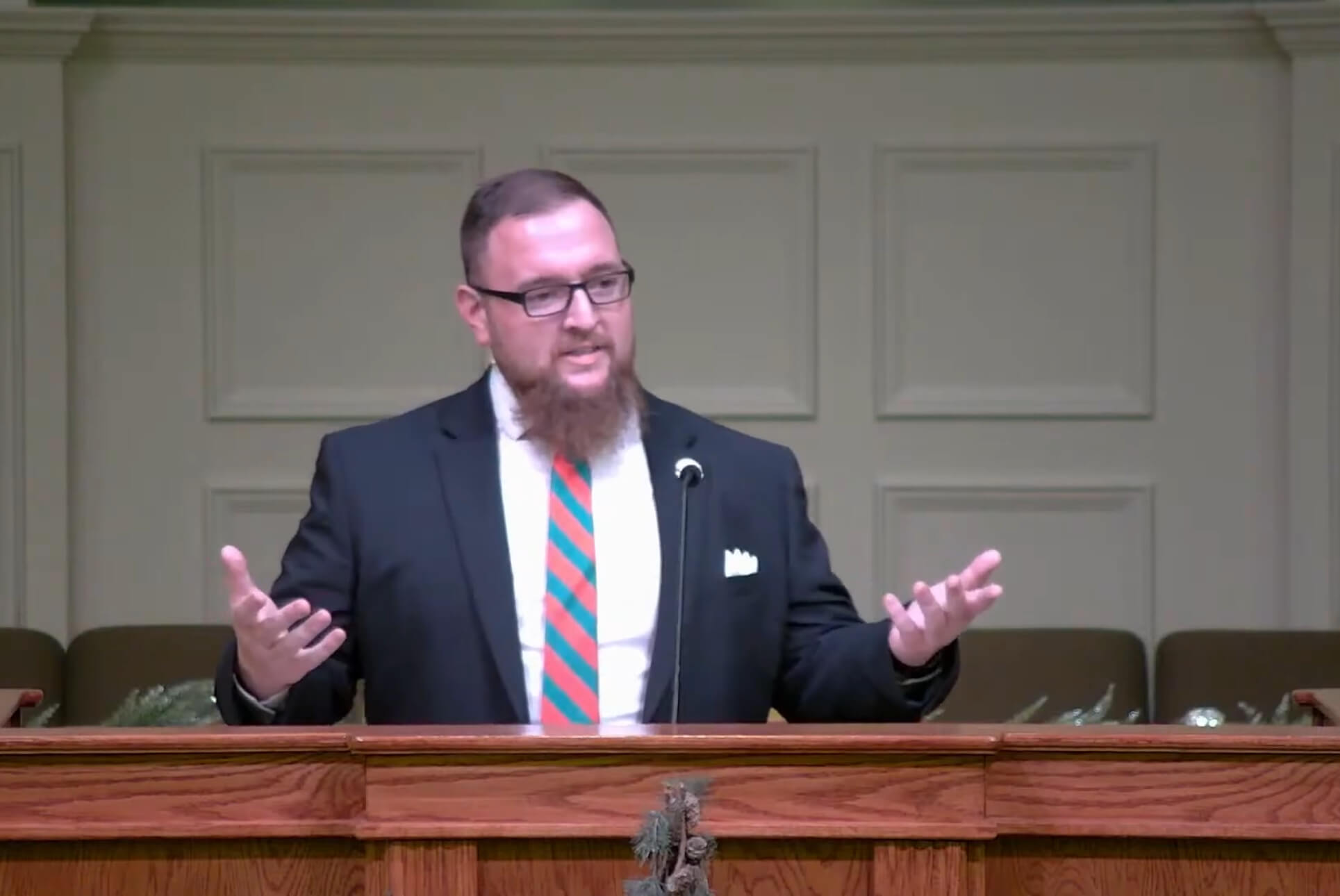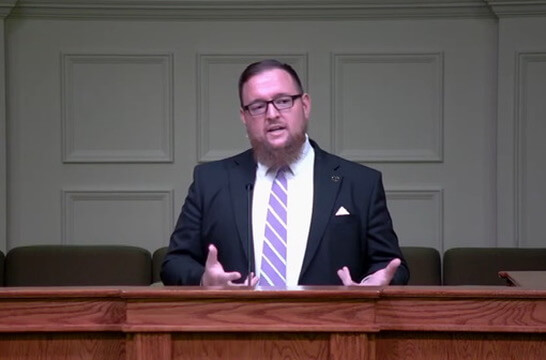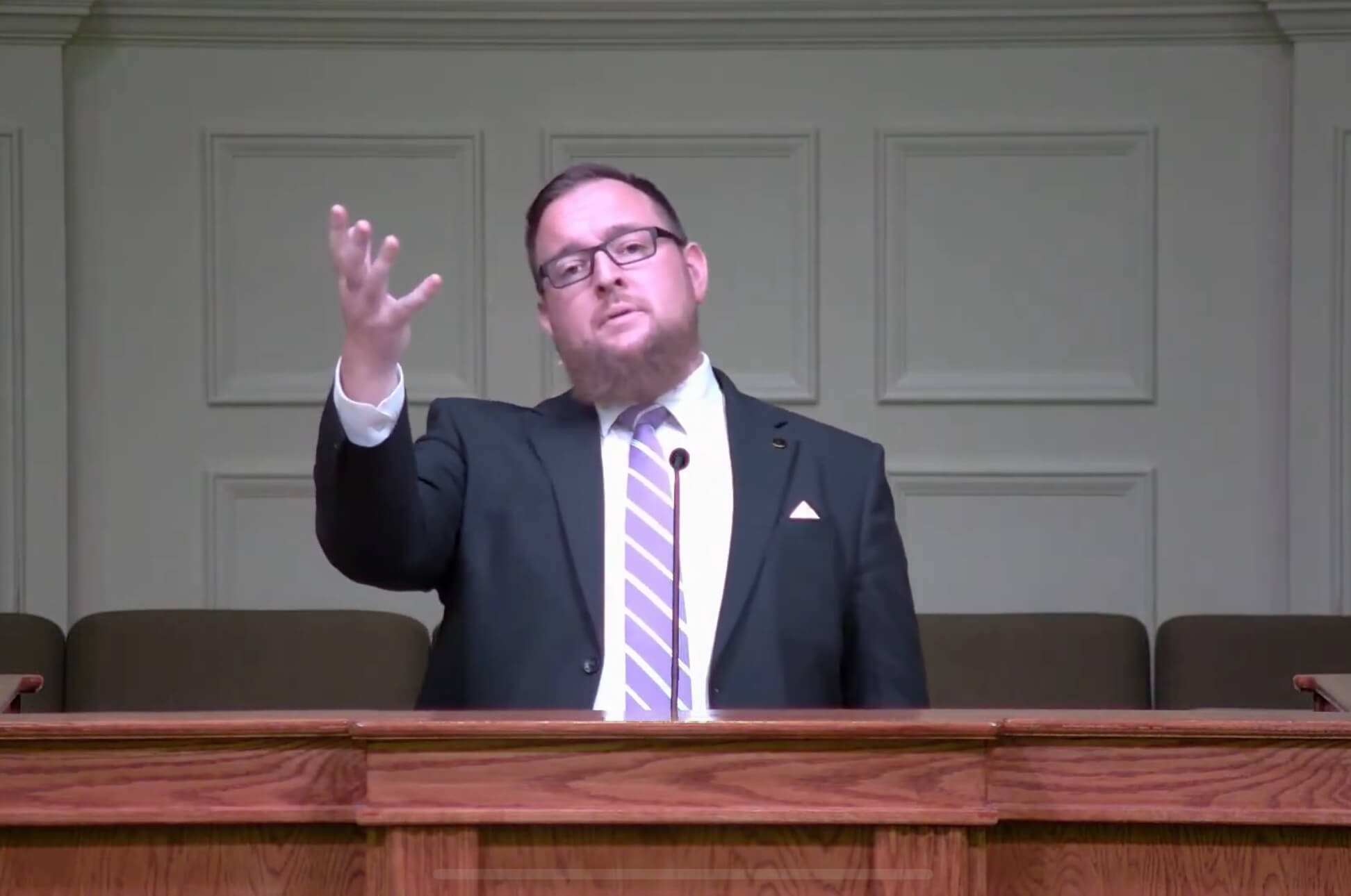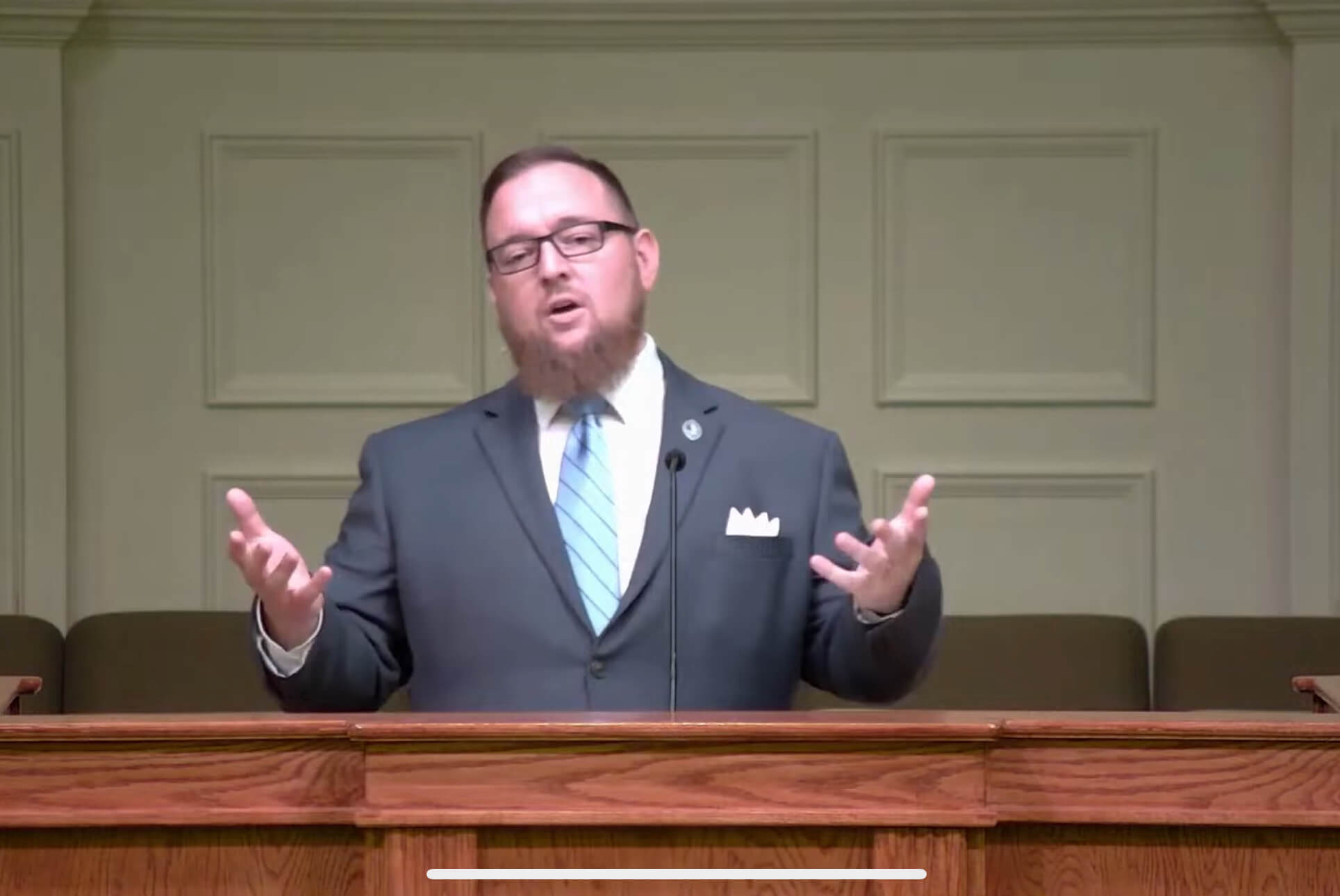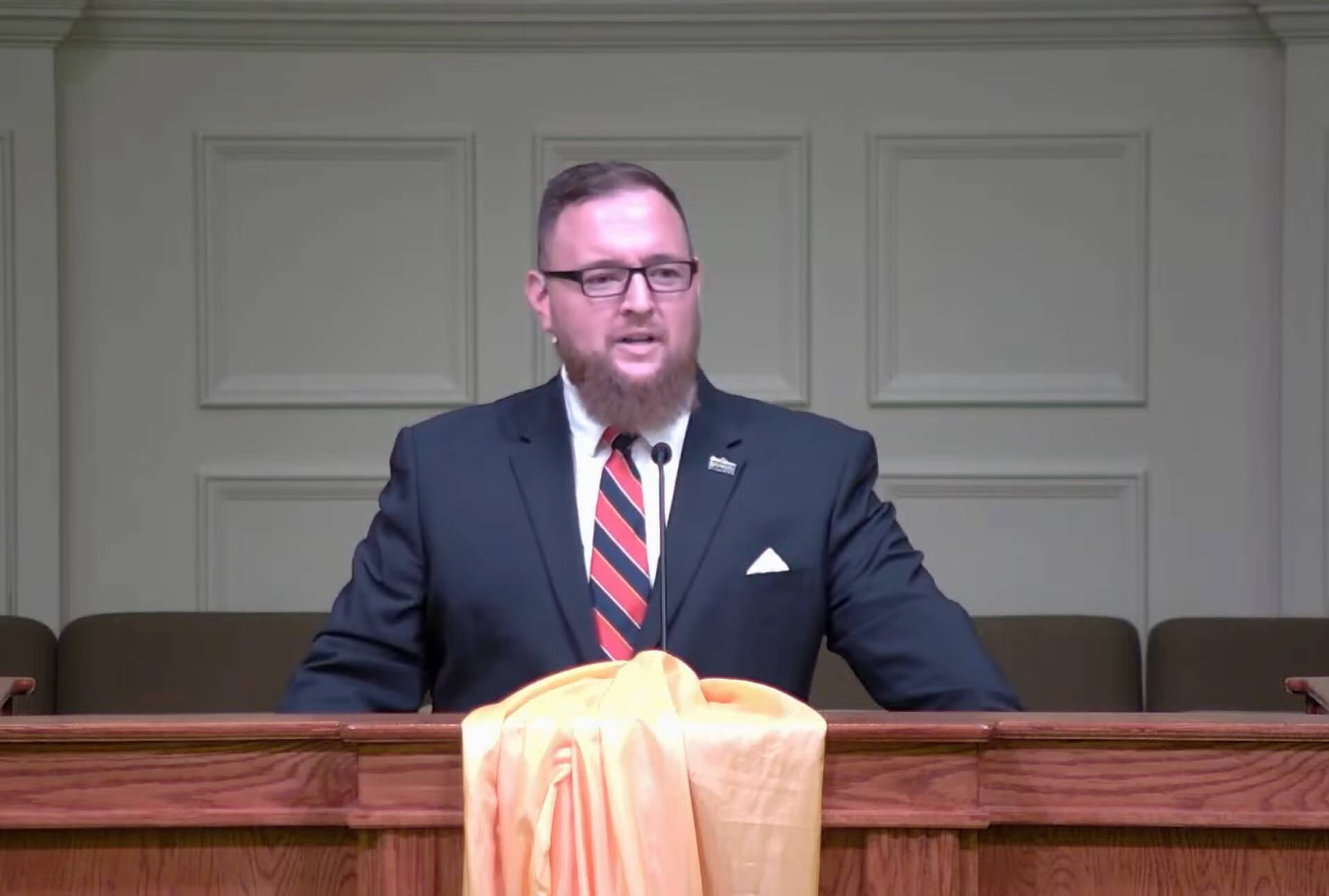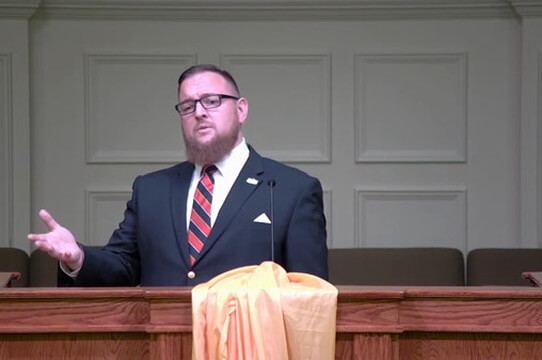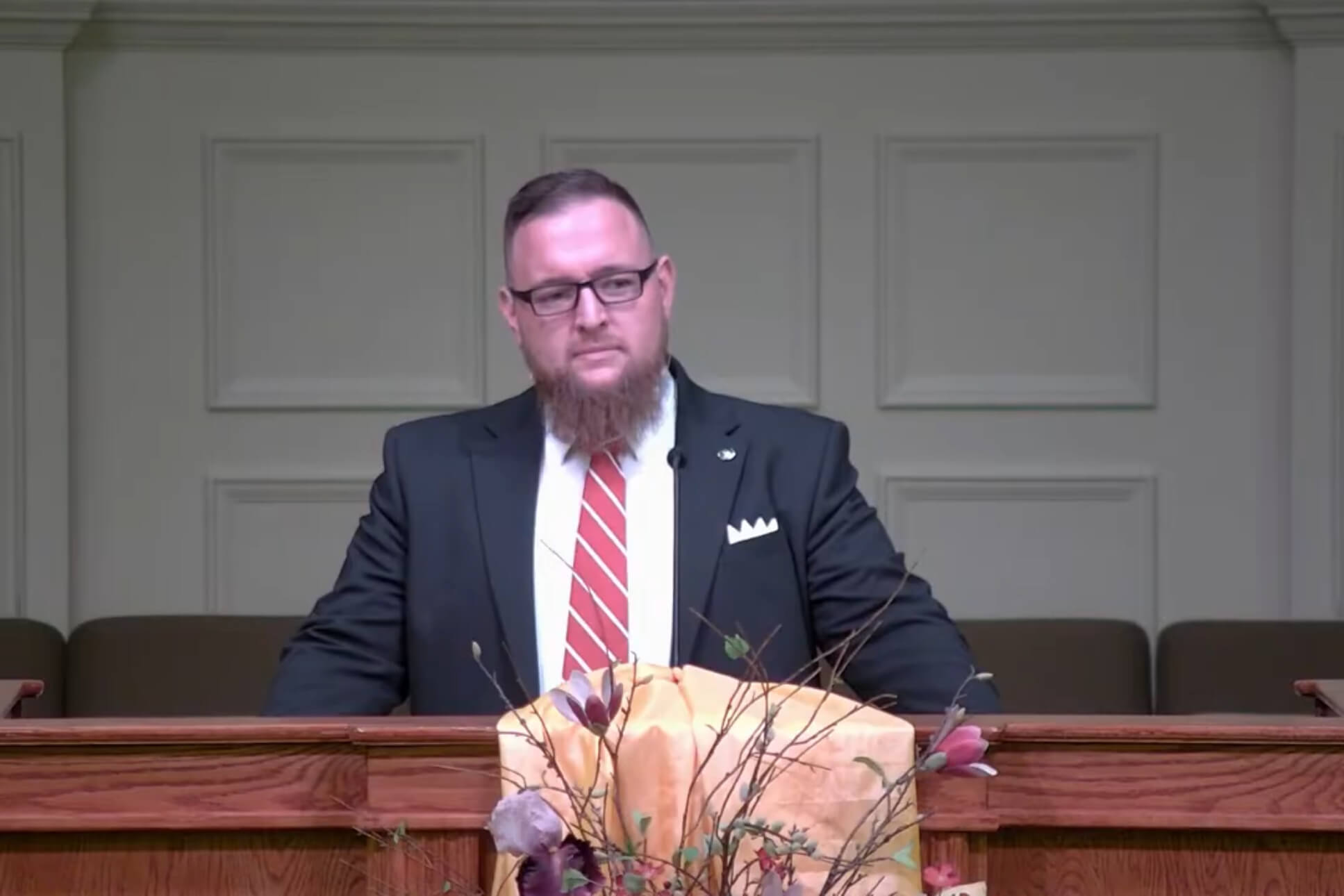Video
“Sing a New Song”
Psalm 98
Pastor Ryan J. McKeen
12/08/2024
Audio
Transcript
The birthday of a king. Birthdays are for celebrating, and that’s what we do this time of year, and that’s what we will see in our passage tonight. So turn with me in your Bibles to Psalm 98. Psalm 98. I’ve been coming through some different Psalms here this fall, and as we approach Christmas season. I found this psalm to be appropriate because I really believe this is a Christmas psalm.
Now, that seems funny to say that the psalms which were written hundreds of years before the incarnation, how can there be a Christmas psalm? Well, you’ll see as we come through this psalm this evening that this psalm celebrates exactly what we celebrate this time of year. It is a song written for the people of God to celebrate salvation, to celebrate the salvation God has given us, God has delivered to us. It points us to the real reason of celebration at all.
There are many, many things that we enjoy about the Christmas season. And depending on your preferences or tastes, there’s different things that we all like. It could be the music, the parties and the people that we fellowship with, the trees, the lights, the time off from work, time spent with families, the giving and receiving of gifts. All of those things are wonderful. And they are what we do to celebrate, to celebrate this time of year. And you have those rain cloud type people that like to try to dampen Christmas spirits by telling us how our traditions and the things that we do at Christmas, well, they’re not really Christian things, they’re pagan traditions.
You’ll hear this from people that will say, well, Christmas trees, they come from a pagan celebration. Or December 25th, that wasn’t really a Christian date. It came from the celebration of Saturnalia, and that was a pagan tradition, and so we shouldn’t celebrate Christmas then. In fact, you can find supposed pagan origins to a lot of things that we do at Christmas. And I was looking this up, and you can look these things up, the pagan origins for things like singing Christmas carols, hanging ornaments, giving presents, decorating your house, and even eating fruitcake. All of those things supposedly have a pagan origin, a pagan tradition that that comes from.
Well, so what? I really don’t care what the origin is. They’re things that we do to celebrate Christ. So those traditions are now our traditions. We’ve taken them and we use them to celebrate Christ. And guess what? We’re not giving them back. because we do them to celebrate the greatest thing that’s ever happened, the incarnation. And we like to take pagans and turn them into Christians, don’t we? So what, let’s do that with our traditions.
But seriously, we do all of these things and more to stir up this holiday spirit in us, to get us in the mood for the season. And in the South, it’s even harder to get yourself in the mood for Christmas when it’s 85 degrees out. Where I grew up, we had a foot of snow, and the light sparkled off the snow, and it was just, you couldn’t help but be in the Christmas spirit. It’s a little different down here, but it still works. We do all these things to stir that up within us. And it’s a good and right thing, because we ought to celebrate The salvation of the Lord. And we’ll see that in this text tonight.
We ought to celebrate the coming of Christ. So, if you are a Scrooge or a Grinch, you probably ought to rethink that after reading Psalm 98, where we are supposed to celebrate the coming of Christ, supposed to celebrate salvation. Because that’s what the Bible tells us to do. And a psalm like Psalm 98 is a place we can turn to and see the Bible telling us to do exactly what happened at the first Christmas, which we’ll see, but also to do exactly what we do at Christmas, to celebrate the salvation of the Lord, to sing songs about salvation.
Psalm 98 is a psalm that doesn’t tell us who the author is. but it’s placed right in the middle of the Psalms of Praise. Psalms are really divided up into different themes, and these are right in the book of the Psalms of Praise. It’s a psalm that instructs us, instructs God’s people to praise him. In this psalm, you see three different stanzas, like a worship song we’d sing would be three different verses. You see that in verses one through three, verses four through six, and then seven through nine. And that’s how we’ll divide this text up this evening.
And first you see a reason why we should celebrate. Then you see instructions that follow that. We should celebrate, therefore, the second section, the second verse is directed towards God’s people. Therefore you celebrate. And then lastly, the last section’s directed to creation, all of creation. should celebrate the salvation of the Lord. You have number one, to celebrate salvation in verses one through three. Secondly, celebrate mankind as a command. And then thirdly, celebrate all of creation.
So let’s read this Psalm this evening. Psalm 98. Psalm 98. This is the word of the Lord. Sing to Yahweh a new song, for he has done wondrous deeds. His right hand and His holy arm have worked out salvation. Yahweh has made known His salvation. He has revealed His righteousness in the eyes of the nations. He has remembered His lovingkindness and His faithfulness to the house of Israel. All the ends of the earth have seen the salvation of our God. Make a loud shout to Yahweh, all the earth. Break forth and sing for joy and sing praises. Sing praises to Yahweh with the lyre, with the lyre and the sound of singing, with trumpets and the sound of the horn. Make a loud shout before King Yahweh. Let the sea roar as well as its fullness. Let the world and all who dwell in it. Let the rivers clap their hands. Let the mountains sing for joy. before Yahweh, for he is coming to judge the earth. And he will judge the world with righteousness and the peoples with equity.”
That’s Psalm 98, a psalm of celebration. As you can see, this psalm contains three main commands. There’s more commands than that, but three main ones that really structure how this psalm is ordered. We see them in verses 1, 4, and 7. Verse 1, you see, sing a new song. Sing to Yahweh or sing to the Lord a new song. Verse 4, the second command, make a loud shout to Yahweh or to the Lord. And then verse 7, let the sea roar. Those are the commands that structure how this psalm is laid out. They all have to do with the praise and worship of our God. The first section we see the reason to celebrate. That is because of salvation. So number one, celebrate salvation. Verses one through four, you see verse one, sing to Yahweh a new song for he has done wondrous deeds. His right hand and his holy arm have worked out salvation.
So first you’re given that command that I just mentioned. Sing. Sing a new song. Sing a new song. And then immediately we’re told why we should. The very next phrase begins with for. For tells us why. Why should we do what the first phrase says? For he has done wondrous deeds. God has earned the right to have a new song sung. Some of your versions have marvelous things. Well, what marvelous things or wondrous deeds has God done? Well, the psalm doesn’t say specifically, but we can probably figure out what he means.
We can think of the many wondrous deeds in the Old Testament that the psalmist probably has in mind. You have creation. God created the entire universe in six days with the breath of his voice. And then men corrupted it. But even at the fall, there was the promise that the seed would come and crush the head of the serpent. Then following that, we see in Genesis the deliverance of Noah and his family through the global flood. There’s another wondrous deed. that God has accomplished.
You have the calling of the patriarchs, Abraham, Isaac, and Jacob. And the many, many instances we see in their lives of God’s direct intervention and his bringing his people together. God delivers Isaac with the replacement sacrifice. With Jacob and Esau, God chooses Jacob and blesses him and his seed, Jacob’s sons, We can read of the stories there of Judah and Simeon and Joseph and Benjamin and all the rest of them. And God’s promise through the words of Jacob to his sons as he blesses his sons that a ruler and a deliverer would come from the line of Judah.
And then you have the Exodus where God delivers his people from slavery in Egypt. As God says, with a mighty hand. God showed his might in delivering this tiny insignificant nation out of the greatest power in the world in Egypt. Then he brings his people through the wilderness to the promised land. He drives out the nations before them and gives them this bountiful land to this small unworthy nation that couldn’t have won it on their own. God delivers them, he gives it to them. And while they’re in the land, despite their continuous unfaithfulness and idolatry, God delivers them again and again. From the Midianites, and the Moabites, and the Hittites, and the Amorites, and the Perizzites, and the Amalekites, and all the other ites that were there.
And then come the kings. They have men like David and Solomon, that God brings great prosperity to the nation of Israel. And that brings us just about up until the time when this psalm was probably written. So there are many, many wondrous deeds that the psalmist may have in mind as he’s writing this. And that was just a brief flyover. of the Old Testament up until this point. There are many, many more wondrous, marvelous things that God has done for his people. In fact, Psalm 40 is a very similar psalm, but it speaks of God’s wondrous deeds this way.
Psalm 40, verse 5, it says, many, O Yahweh my God, are the wondrous deeds you have done in your thoughts toward us. There is none to compare with you. I would declare and speak of them, but they are too numerous to recount. There’s too many. You can’t even speak of them all. God’s wondrous deeds are too numerous to recount. So that’s how the psalmist opens this song for the people of God. Sing to Yahweh a new song, for he has done wondrous deeds. And then he does get a little bit specific. He narrows in a little bit on what he’s talking about. At the end of verse 1 he says, “…his right hand and his holy arm have worked out his salvation.” So specifically speaking of salvation. He’s worked out this salvation. Some of your versions say that he has gained the victory. It’s the same idea.
He has saved his people. He has won the victory for them. And God has accomplished salvation for His people. That is true. Amen? But not only that, not only has He done it, verse 2, Yahweh has made known His salvation. He’s revealed His righteousness in the eyes of the nations. Not only did He do it, He told us about it. Not only has God saved his people, he had it recorded in his word. The stories of his deliverance and the deliverance of his people throughout the generations. The reason why we have books like 1 and 2 Samuel, and 1 and 2 Kings, and Joshua, and Judges, and Ruth, and all the stories in the Old Testament, they tell of the salvation of God. God continuously saves his people.
He made sure that we had the stories from thousands of years ago preserved even up till today. Why? Why did he do that? Because he wants us to know him. He wants us to know what kind of a God he is. He wants us to know what he’s like. And he’s revealed his righteousness to the nations, it says. That’s why Romans 1 tells us everyone’s without excuse because God has revealed his righteousness to the nations. And you can either worship him for it or reject him and twist the truth and deny him and suppress the truth in unrighteousness. All of the nations can know the righteousness of God because he’s chosen to reveal it.
Psalm 98 verse 3 goes on to say, he has remembered his loving kindness and his faithfulness to the house of Israel. All the ends of the earth have seen the salvation of our God. He’s remembered his loving kindness. That’s that Hebrew word hesed. I’ve mentioned it before. It speaks of the central aspect of God’s character, his mercy, his grace, his patience, his kindness, his love, He’s remembered who he is. Not that he forgot, but he showed it to us again, who he is. And it doesn’t say that he’s saved all people. It says he saved his people. He has remembered his loving kindness and faithfulness to the house of Israel. He’s remembered the covenant that he made with his people. Yahweh is a covenant-keeping God.
If there’s any impression you should get from the Old Testament, it’s that. God keeps his covenants. He keeps his promises. God is a promise-keeping God. If he has promised it, he will do it. And this verse also says, all the ends of the earth have seen the salvation of our God. Again, he’s made it known that he saves his people. And this is just the first stanza of this song. And you can hear the echoes of what we sing at Christmas. The songs that we sing. The songs that we read about in scripture.
In Mary’s Magnificat, it’s called. The song that Mary sings. In praise to God, it’s her praise song. After she finds out that she will bear the child who is Christ the Lord, who is Emmanuel, she sings. She sings about it. In Luke chapter 1, verse 54 and 55, she says this, of God. He has given help to Israel, his servant, in remembrance of his mercy. as he spoke to our fathers, to Abraham and to his seed forever. In remembrance of his mercy, or you could say his loving kindness. That’s that same idea. He remembered who he is. He remembered his covenant, his promise to his people. He has given help to Israel, his servant. Just like Psalm 98.3 says he has remembered his loving kindness and his faithfulness to the house of Israel. Mary saw what the psalmist saw. God saved his people because he promised he would. God keeps his promises of salvation.
And not just Mary, Zechariah. When Zechariah gains his voice back, After his son John the Baptist is born, what’s he do? He sings. He sings out in Luke 1 verses 67 to 73, it says this, blessed be the Lord God of Israel for he has visited and accomplished redemption for his people and raised up a horn of salvation for us in the house of David his servant. As he spoke by the mouth of his holy prophets from of old, salvation from our enemies and from the hand of all who hate us to show mercy toward our fathers and to remember his holy covenant, the oath that he swore to Abraham, our father. Zechariah saw what the psalmist saw. He has remembered his loving kindness and his faithfulness to the house of Israel. Mary and Zechariah and the psalmist all saw that God keeps his promises, keeps his promise of salvation for his people.
And not only that, Mary and Zechariah are doing, they’re obeying exactly what Psalm 98 says to do. Sing to Yahweh a new song. Why? Because Yahweh has made known His salvation. They’re doing what Psalm 98 says to do. That is what they celebrated at the very first Christmas. And that’s what we celebrate even now. That God has made his salvation known. He’s kept his promises. He told us about it. And the Bible tells us there is salvation in no one else. For there is no other name under heaven given among men by which we must be saved. We are to sing of God’s salvation for his people and their salvation in no one else but the one who came to be born of a virgin. Jesus Christ the Lord. He was born a miraculous birth.
But he came not just to be born miraculously, as amazing as that is. He didn’t just come to be born miraculously, he came to live perfectly. He came to live in perfect obedience. He lived the life we were supposed to live in obedience to every command and law of God. He did it perfectly so that his righteousness could be credited to our behalf, so that we could stand before God accepted because of his righteousness. And He came not just to be born miraculously and to live perfectly, He came to die sacrificially.
He died as a sacrifice in our place. He did nothing to deserve death in His whole life. And you and I have done things to deserve death even today. But in complete obedience to the Father’s will. Even though His human flesh was crying out with all that He could, don’t let this happen, let this cup pass from me, He died in our place, willingly. Because not only was He born miraculously and He lived perfectly, but He took on our sin on His body on the cross to die the death that we couldn’t die. and he died sacrificially.
And then, most importantly, he rose triumphantly. Death could not hold him. Yes, he really did live and he really did die, but he didn’t stay dead. He rose again the third day, according to the scriptures, just like God promised. He rose victorious over sin and death. He purchased salvation, deliverance, eternity for his people. And now, because of his miraculous birth, his perfect life, his sacrificial death, and his triumphant resurrection, we can have salvation. We can have the salvation that Psalm 98 sings about.
If we come to him in faith, faith alone. Because Romans 10 verses 9 and 10 tells us that if you confess with your mouth that Jesus is Lord, and you believe in your heart that God raised him from the dead, you will be saved. For with the heart a person believes and is justified, and with the mouth he confesses and is saved. That is the result of what he came to do. That is the salvation that God delivered to his people. And that is available to you today if you come to him in faith, if you confess that you’re a sinner just like the rest of us, and you cry out to the Lord Jesus Christ to be your savior, to save you from the sin that separates you from God. And if you do, he will cleanse you of your sin. and bring you into a right relationship with himself. That is the salvation that Yahweh has made known to his people. That is why we celebrate.
And that is just the first stanza of this song. Sing to Yahweh a new song, for he has done wondrous deeds. He has made known his salvation. All the ends of the earth have seen the salvation of our God. Make it known. Sing about it. So that’s number one, celebrate salvation. And the next two stanzas, really the rest of the psalm, are explaining what it is to obey the first stanza, the first three verses, that first command, to sing a new psalm. We now see in stanza two that’s directed specifically at God’s people. Those who call him their king.
Verses four through six say this. Make a loud shout to Yahweh, all the earth. Break forth and sing for joy and sing praises. Sing praises to Yahweh with the lyre, with the lyre and the sound of singing, with trumpets and the sound of the horn. Make a loud shout before King Yahweh. We see repeated commands here, different ways to accomplish what the first verse tells us to do, sing a new song. Because of the salvation that God has delivered, we are to sing, we are to make a loud shout, to break forth in praise, and to do that with instruments. Some of this may sound familiar because this is deliverance language, to make a loud shout, to break forth in praise.
One passage speaking of deliverance that we usually read around Palm Sunday uses this very language. In Zechariah 9, verses 9 through 10, it tells of the king who will be coming on the foal of a donkey. Rejoice greatly. O daughter of Zion, make a loud shout, O daughter of Jerusalem. Behold, your king is coming to you. He is righteous and he’s endowed with salvation, lowly mounted on a donkey, even on a colt, the foal of a donkey. I will cut off the chariot from Ephraim and the horse from Jerusalem and the bow of war will be cut off and he will speak peace to the nations. And his reign will be from sea to sea and from the river to the ends of the earth. Israel’s to make a loud shout because their king is coming. We see this elsewhere in other deliverance prophecies.
In Isaiah 14, the prophet Isaiah tells of the day when God’s people will finally be delivered from their enemies. Isaiah 14.7 says, the whole earth is at rest and is quiet. They break forth into shouts of joy. That will be the day, huh? The whole earth, the whole earth is at rest and quiet. They break forth in shouts of joy. Verse four of Psalm 98, make a loud shout to Yahweh, all the earth. Break forth and sing praises. Break forth and sing for joy. This is salvation language. The psalm goes on in the next few verses to command singing, making music with instruments, and it says, make a loud shout before King Yahweh. The King. Make music for the King who’s coming. This is the King of kings. The Lord of lords. The one true King. Jesus Christ.
You can see why when Jesus is said to be the king, that the Jews realized he was claiming to be God. Because Yahweh’s the king. And if Jesus is the king, that means Jesus is Yahweh. He is the one who has come. He is the king.
And as Isaiah tells us elsewhere, chapter 9, a favorite chapter at this time of year. Isaiah 9, verses 6 and 7, for unto us a child is born. Unto us a son is given. The government will rest upon his shoulders. His name will be called Wonderful, Counselor, Mighty God. Eternal Father, Prince of Peace, there will be no end to the increase of his government or of peace on the throne of David and over his kingdom to establish it, to uphold it with justice and righteousness from then on and forevermore. The zeal, my favorite line of this whole prophecy, the zeal of Yahweh of hosts will accomplish this. The passion of God will make sure that this happens. This is the King.
O people of God, make a loud shout before the King, King Yahweh. That is the command of this second stanza of Psalm 98. Celebrate, make a loud shout to the King.
And thirdly, and finally, the last section of this psalm speaks to all of creation. All of creation is to make a joyful noise to the Lord, to make a loud shout, to praise God in whatever way they can. Verses seven through nine. Let the sea roar as well as its fullness, the world and all those who dwell in it. Let the rivers clap their hands. Let the mountains sing for joy before Yahweh, for He is coming to judge the earth. He will judge the world with righteousness and the peoples with equity. All of creation is involved here. Let the sea roar. Let the rivers clap their hands. Let the mountains sing.
When creation does what God created it to do, it’s praising God. It’s doing what he created it for. And this happens most gloriously when the king and the judge of all the earth rules and reigns in righteousness. Because right now, the seas and the rivers and the mountains, they’re not roaring and clapping and singing the way that they could. The worship of God is not what it should be yet. Not just from people, but from the earth, from creation. We know this from Romans chapter eight.
In Romans chapter eight, Verses 19-21, it says, the anxious longing of creation eagerly waits for the revealing of the sons of God. For the creation was subjected to futility, not willingly, but because of him who subjected it, in hope that creation itself will also be set free from its slavery to corruption and to the freedom of the glory of the children of God. Creation will be set free. To praise God the way that it was created to.
When the King comes. When he returns to rule in righteousness. Because not only do we celebrate his miraculous birth. And his perfect life. And his sacrificial death. And his triumphant resurrection. All of those things are essential to what we celebrate at Christmas. It’s not just the birth, it’s all of it. But even that leaves out a crucial piece of what we celebrate. Because the final piece of our celebration is here in the last verse of Psalm 98. For he is coming to judge the earth. He will judge the world with righteousness and the people with equity.
He’s coming back. That’s the final piece of our celebration. He is coming to rule and to reign. This is the reason for the Christian’s hope. This is why we sing about salvation. Our King is coming again to rule and to reign from the earth. All of creation will be made new. We will have a new heavens and a new earth. And most importantly, Jesus Christ, the King, he’s coming to judge the world in righteousness and the peoples with equity. We don’t even have a taste of what that’s like. Can you imagine when righteousness and justice and equity is actually done on the earth? But that’s what we look forward to. That’s what we sing about.
Psalm 98 is a Christmas song. It commands us to celebrate. It commands us to sing to Yahweh a new song. Because He has provided salvation for His people. He has shown it to all the earth. And He is coming again. That is why we can sing, joy to the world, the Lord is come, let earth receive her king. And we’ll sing that here in just a moment. But if you do not yet know Christ, this Christmas season is the perfect time for you to come to him. Come to him and confess that you’re a sinner. Come to him and cry out to him for salvation. And then you too will have a reason to sing joy to the world. And Christmas is the perfect time to tell those you know who don’t know Christ why it is that we celebrate.
Why it is that we celebrate salvation? What on earth is everyone so happy about? The King is coming! God has provided salvation for his people. Jesus Christ came and he was born and he lived and he died and he rose again. He did all of that to provide salvation for his people.
Let’s stand and close in a word of prayer this evening before we sing our final song. Our God in heaven, we are humbled by a passage like Psalm 98. And we are excited by a passage like Psalm 98. We are in awe of what you’ve done for your people to provide salvation in the person and work of Jesus Christ. The miracles that you performed because the zeal of Yahweh will make this happen. Lord, we thank you and praise you for providing salvation for us, for giving us a reason to celebrate at Christmas. And we pray that a passage like this will motivate us and remind us of why it is that we celebrate. We thank you for who you are. We pray that your name is glorified in our singing. We pray this in Jesus’ name. Amen.
